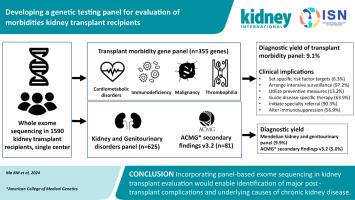当前位置:
X-MOL 学术
›
Kidney Int.
›
论文详情
Our official English website, www.x-mol.net, welcomes your
feedback! (Note: you will need to create a separate account there.)
Developing a genetic testing panel for evaluation of morbidities in kidney transplant recipients
Kidney International ( IF 14.8 ) Pub Date : 2024-03-21 , DOI: 10.1016/j.kint.2024.02.021 Becky M Ma 1 , Naama Elefant 2 , Martina Tedesco 3 , Kelsie Bogyo 2 , Natalie Vena 2 , Sarath K Murthy 2 , Shiraz A Bheda 2 , Sandy Yang 2 , Nikita Tomar 2 , Jun Y Zhang 2 , Syed Ali Husain 4 , Sumit Mohan 4 , Krzysztof Kiryluk 2 , Hila Milo Rasouly 2 , Ali G Gharavi 2
Kidney International ( IF 14.8 ) Pub Date : 2024-03-21 , DOI: 10.1016/j.kint.2024.02.021 Becky M Ma 1 , Naama Elefant 2 , Martina Tedesco 3 , Kelsie Bogyo 2 , Natalie Vena 2 , Sarath K Murthy 2 , Shiraz A Bheda 2 , Sandy Yang 2 , Nikita Tomar 2 , Jun Y Zhang 2 , Syed Ali Husain 4 , Sumit Mohan 4 , Krzysztof Kiryluk 2 , Hila Milo Rasouly 2 , Ali G Gharavi 2
Affiliation

|
Cardiovascular disease, infection, malignancy, and thromboembolism are major causes of morbidity and mortality in kidney transplant recipients (KTR). Prospectively identifying monogenic conditions associated with post-transplant complications may enable personalized management. Therefore, we developed a transplant morbidity panel (355 genes) associated with major post-transplant complications including cardiometabolic disorders, immunodeficiency, malignancy, and thrombophilia. This gene panel was then evaluated using exome sequencing data from 1590 KTR. Additionally, genes associated with monogenic kidney and genitourinary disorders along with American College of Medical Genetics (ACMG) secondary findings v3.2 were annotated. Altogether, diagnostic variants in 37 genes associated with Mendelian kidney and genitourinary disorders were detected in 9.9% (158/1590) of KTR; 25.9% (41/158) had not been clinically diagnosed. Moreover, the transplant morbidity gene panel detected diagnostic variants for 56 monogenic disorders in 9.1% KTRs (144/1590). Cardiovascular disease, malignancy, immunodeficiency, and thrombophilia variants were detected in 5.1% (81), 2.1% (34), 1.8% (29) and 0.2% (3) among 1590 KTRs, respectively. Concordant phenotypes were present in half of these cases. Reviewing implications for transplant care, these genetic findings would have allowed physicians to set specific risk factor targets in 6.3% (9/144), arrange intensive surveillance in 97.2% (140/144), utilize preventive measures in 13.2% (19/144), guide disease-specific therapy in 63.9% (92/144), initiate specialty referral in 90.3% (130/144) and alter immunosuppression in 56.9% (82/144). Thus, beyond diagnostic testing for kidney disorders, sequence annotation identified monogenic disorders associated with common post-transplant complications in 9.1% of KTR, with important clinical implications. Incorporating genetic diagnostics for transplant morbidities would enable personalized management in pre- and post-transplant care.
中文翻译:

开发用于评估肾移植受者发病率的基因检测小组
心血管疾病、感染、恶性肿瘤和血栓栓塞是肾移植受者 (KTR) 发病和死亡的主要原因。前瞻性地识别与移植后并发症相关的单基因疾病可能有助于实现个性化管理。因此,我们开发了与主要移植后并发症相关的移植发病率面板 (355 个基因),包括心脏代谢紊乱、免疫缺陷、恶性肿瘤和易栓症。然后使用来自 1590 KTR 的外显子组测序数据评估该基因面板。此外,还注释了与单基因肾脏和泌尿生殖系统疾病相关的基因以及美国医学遗传学学会 (ACMG) 的次要发现 v3.2。总共在 9.9% (158/1590) 的 KTR 中检测到 37 个与孟德尔肾和泌尿生殖系统疾病相关的基因的诊断变异;25.9% (41/158) 未被临床诊断。此外,移植发病率基因组在 9.1% KTR 中检测到 56 种单基因疾病的诊断变异 (144/1590)。在 1590 例 KTR 中,分别检测到 5.1% (81) 、 2.1% (34) 、 1.8% (29) 和 0.2% (3) 的心血管疾病、恶性肿瘤、免疫缺陷和易栓症变异。这些病例中有一半存在一致的表型。回顾对移植护理的影响,这些遗传发现将使医生能够在 6.3% (9/144) 中设定特定的风险因素目标,在 97.2% (140/144) 中安排密切监测,在 13.2% (19/144) 中利用预防措施,在 63.9% (92/144) 中指导疾病特异性治疗,在 90.3% (130/144) 中启动专科转诊,在 56.9% (82/144) 中改变免疫抑制。 因此,除了肾脏疾病的诊断测试外,序列注释还在 9.1% 的 KTR 中确定了与常见移植后并发症相关的单基因疾病,具有重要的临床意义。结合移植发病率的基因诊断将有助于在移植前和移植后护理中实现个性化管理。
更新日期:2024-03-21
中文翻译:

开发用于评估肾移植受者发病率的基因检测小组
心血管疾病、感染、恶性肿瘤和血栓栓塞是肾移植受者 (KTR) 发病和死亡的主要原因。前瞻性地识别与移植后并发症相关的单基因疾病可能有助于实现个性化管理。因此,我们开发了与主要移植后并发症相关的移植发病率面板 (355 个基因),包括心脏代谢紊乱、免疫缺陷、恶性肿瘤和易栓症。然后使用来自 1590 KTR 的外显子组测序数据评估该基因面板。此外,还注释了与单基因肾脏和泌尿生殖系统疾病相关的基因以及美国医学遗传学学会 (ACMG) 的次要发现 v3.2。总共在 9.9% (158/1590) 的 KTR 中检测到 37 个与孟德尔肾和泌尿生殖系统疾病相关的基因的诊断变异;25.9% (41/158) 未被临床诊断。此外,移植发病率基因组在 9.1% KTR 中检测到 56 种单基因疾病的诊断变异 (144/1590)。在 1590 例 KTR 中,分别检测到 5.1% (81) 、 2.1% (34) 、 1.8% (29) 和 0.2% (3) 的心血管疾病、恶性肿瘤、免疫缺陷和易栓症变异。这些病例中有一半存在一致的表型。回顾对移植护理的影响,这些遗传发现将使医生能够在 6.3% (9/144) 中设定特定的风险因素目标,在 97.2% (140/144) 中安排密切监测,在 13.2% (19/144) 中利用预防措施,在 63.9% (92/144) 中指导疾病特异性治疗,在 90.3% (130/144) 中启动专科转诊,在 56.9% (82/144) 中改变免疫抑制。 因此,除了肾脏疾病的诊断测试外,序列注释还在 9.1% 的 KTR 中确定了与常见移植后并发症相关的单基因疾病,具有重要的临床意义。结合移植发病率的基因诊断将有助于在移植前和移植后护理中实现个性化管理。

































 京公网安备 11010802027423号
京公网安备 11010802027423号